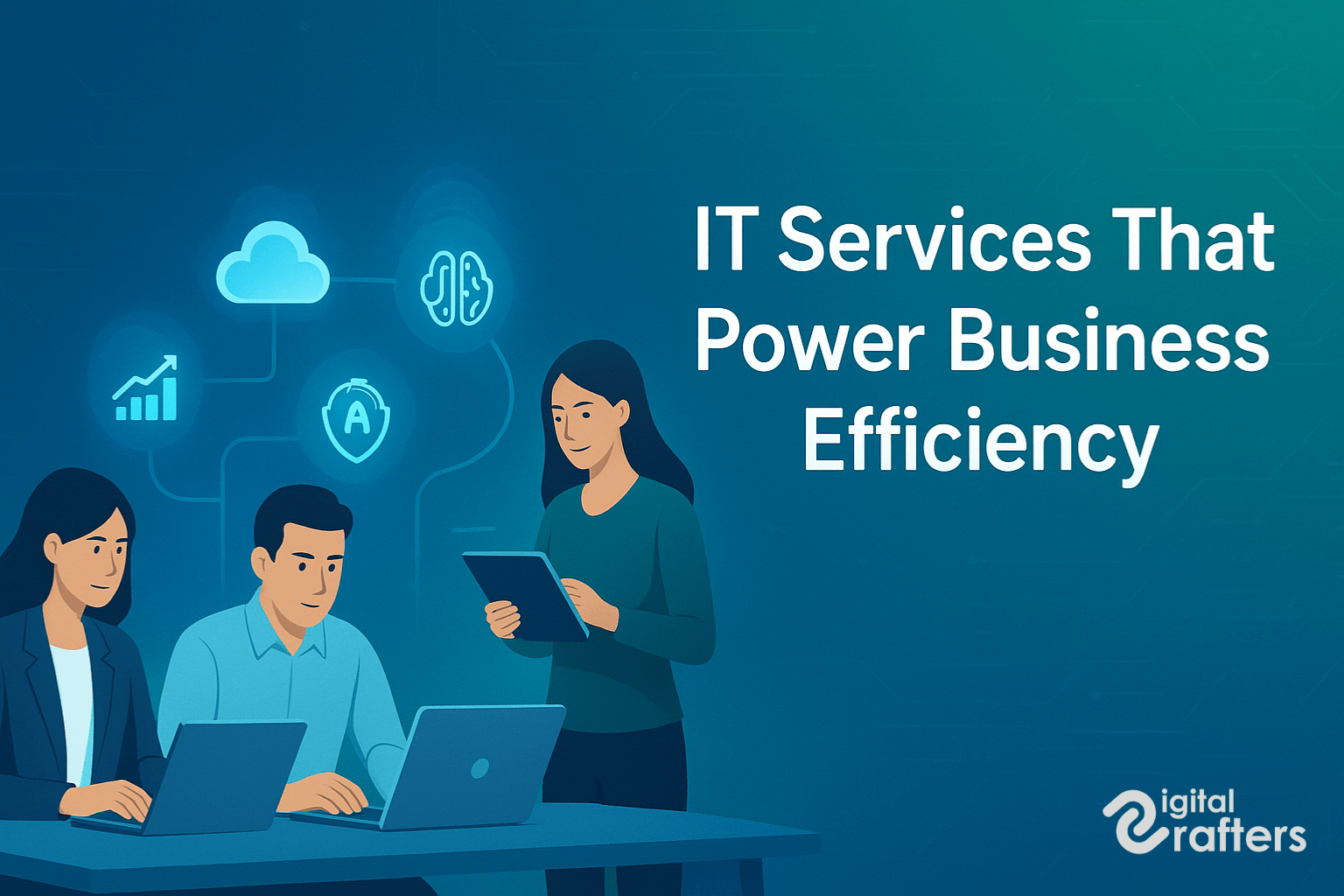
According to a 2024 Gartner report, global spending on IT services is projected to surpass $1.5 trillion, reflecting how essential technology has become for business operations. From small startups to global enterprises, companies are investing in IT not just to keep systems running, but to streamline workflows, cut costs, and remain competitive in fast-changing markets.
Modern IT services play a direct role in driving efficiency. Tools like cloud computing reduce infrastructure expenses, cybersecurity services safeguard valuable data, and automation eliminates repetitive manual tasks. The result is faster processes, more reliable systems, and teams that can focus on strategic work rather than troubleshooting technical problems.
This blog will break down how IT services improve business efficiency, outline the types of IT services available, and provide a practical list of IT services that organizations can adopt. We’ll also explore how choosing the right IT service business can help companies scale, stay secure, and achieve measurable productivity gains.
At its core, IT services for business refer to the application of technology solutions that help organizations run efficiently, securely, and at scale. These services cover a wide range of functions—from managing computer networks and securing sensitive data to providing technical support and deploying cloud-based systems. Unlike one-time software purchases, IT services are ongoing solutions designed to support the daily needs of a business while preparing it for future growth.
In day-to-day operations, IT services play a practical role. Employees rely on stable networks, secure communication tools, and responsive technical support to perform their jobs without interruption. On a broader level, IT services also safeguard businesses against risks like cyberattacks and data loss, ensuring compliance with regulations and maintaining customer trust. For growing companies, IT services provide the flexibility to scale resources, integrate new tools, and support expansion into new markets.
The value of IT services is measured not only by keeping systems running but also by the efficiency gains they create. When implemented well, IT services reduce downtime, cut unnecessary costs, and allow teams to work smarter with the right tools in place. This efficiency becomes the foundation for long-term competitiveness in today’s digital economy.
One of the most direct benefits of IT services is the ability to reduce manual work. Cloud platforms, workflow automation tools, and enterprise resource planning (ERP) systems replace time-consuming processes with efficient digital solutions. For example, automated invoice processing eliminates repetitive data entry, while ERP systems connect finance, inventory, and customer data into one platform. These tools free up employees to focus on higher-value tasks and speed up core operations across the organization.
Businesses generate massive amounts of data every day, and without proper systems, much of it goes unused. IT services provide structured data collection, secure storage, and advanced analytics tools that make information actionable. Real-time dashboards and reporting tools allow managers to track performance, identify problems early, and respond with data-backed decisions. With accurate information at their fingertips, businesses can move faster and stay ahead of competitors.
The modern workplace depends on smooth communication, especially with remote and hybrid teams. IT services enable collaboration through video conferencing, shared cloud storage, and project management platforms. Employees can work together from different locations without delays, ensuring projects move forward without communication gaps. Better collaboration translates into shorter decision cycles and stronger team productivity.
Cybersecurity threats and unexpected downtime can disrupt operations and damage customer trust. IT services help protect against these risks with firewalls, data encryption, multi-factor authentication, and continuous monitoring. Beyond prevention, many providers also implement disaster recovery and business continuity planning, ensuring critical systems remain available even in the event of an outage or cyberattack. This protection not only secures data but also preserves efficiency by minimizing disruptions.
With managed IT services, businesses outsource the management of their networks, devices, and systems to a professional provider. This reduces downtime, lowers in-house IT costs, and ensures technology runs smoothly. Efficiency comes from proactive monitoring and maintenance that prevents problems before they disrupt operations.
Cloud solutions allow businesses to store data, run applications, and collaborate online without the need for heavy hardware investments. By offering flexible storage, remote access, and scalability, cloud computing makes it easier for teams to work efficiently from anywhere.
Reliable connectivity is the backbone of any business. Network management services oversee the design, monitoring, and optimization of IT networks. A stable, secure network reduces interruptions, supports faster communication, and helps employees stay productive.
Protecting data and systems from cyberattacks is critical for business continuity. Cybersecurity services include firewalls, intrusion detection, encryption, and security audits. By preventing breaches and minimizing risks, businesses avoid costly downtime and maintain operational efficiency.
Unexpected events like system failures or cyberattacks can wipe out valuable information. Data backup and disaster recovery services create secure copies of critical data and ensure quick restoration. This minimizes downtime and keeps businesses running even in the face of disruptions.
IT consulting helps businesses align their technology with long-term goals. Consultants assess current systems, recommend improvements, and guide digital transformation efforts. This strategic approach ensures IT investments deliver measurable efficiency and support growth.
When employees face technical issues, productivity slows. Helpdesk and support services provide quick troubleshooting and problem resolution. Whether it’s fixing software glitches or resolving login errors, responsive support keeps operations on track and employees focused.
IT services cover several categories, each addressing different areas of business operations. Understanding these types helps companies choose the right solutions to improve efficiency and reduce unnecessary costs.
Infrastructure services include setting up and managing networks, servers, and hardware. These services provide the foundation for reliable connectivity and system performance. A well-structured IT infrastructure ensures employees have stable access to the tools they need, minimizing downtime and boosting productivity.
Software services focus on applications that help businesses run smoothly. This can include custom software development, SaaS (software-as-a-service) platforms, and system integrations. By tailoring tools to specific business needs and automating workflows, software services reduce manual work and improve overall efficiency.
Consulting services guide companies in aligning technology with business goals. This may involve IT strategy, compliance planning, or digital transformation initiatives. The benefit lies in expert recommendations that prevent wasted investment and ensure technology decisions lead to measurable performance improvements.
Support services cover maintenance, troubleshooting, and user assistance. When systems fail or employees run into technical issues, responsive support keeps operations on track. Quick resolutions reduce downtime, allowing teams to stay focused on core business activities.
Each type of IT service addresses a different part of business efficiency. Infrastructure creates stability, software drives automation, consulting ensures long-term alignment, and support minimizes disruptions. Together, they form a complete IT service model that helps businesses operate faster, safer, and smarter.
Partnering with an IT services business gives companies access to expertise, tools, and strategies that go beyond in-house capabilities. These providers deliver measurable value by tailoring technology to industry needs, lowering costs, and offering flexibility as businesses grow.
Every industry has unique technology challenges. In healthcare, IT services focus on securing patient records and meeting HIPAA compliance. In finance, they emphasize fraud prevention and real-time transaction monitoring. Retail companies depend on inventory management systems, while eCommerce platforms rely on secure payment gateways and scalable cloud hosting. By providing specialized solutions, an IT service business ensures technology supports both compliance and efficiency in a company’s specific market.
Outsourcing IT needs to a dedicated provider reduces the expense of maintaining a full in-house IT team. Businesses gain access to experienced professionals, advanced tools, and 24/7 support at a predictable cost. This model eliminates the overhead of recruiting, training, and retaining staff while still ensuring that systems run efficiently. For many companies, outsourcing to an IT services business translates into lower risk, better technology, and more room in the budget for growth initiatives.
As companies expand, their IT requirements change. An IT service business offers scalable solutions that grow alongside the organization. For example, a retailer can increase cloud storage capacity during peak shopping seasons, or a financial services firm can add extra layers of cybersecurity as transaction volumes rise. Infrastructure, security, and support can all be scaled up or down based on demand, giving businesses the flexibility to adapt without disruption.
Selecting the right IT services business can determine whether your technology becomes a competitive advantage or a constant challenge. With many providers in the market, it’s important to evaluate both their expertise and the value they bring to your organization.
Expertise and Industry Experience – Look for providers who have worked with businesses in your sector. Industry-specific knowledge helps them anticipate challenges and design solutions that fit your operations.
Range of Offered Services – Some companies offer broad IT coverage, while others specialize in areas such as cybersecurity or cloud computing. A wide service range is ideal for businesses seeking an all-in-one partner, while specialized providers may suit companies with a very specific need.
Client Support and Service-Level Agreements (SLAs) – Strong support is critical when issues arise. Review their response times, availability, and SLAs to ensure they can provide the reliability your business requires.
Before signing a contract, ask questions that reveal how the provider operates:
By carefully reviewing these factors and asking the right questions, you can choose an IT services partner that not only supports your current needs but also scales with your long-term goals.
The role of IT services in business is expanding rapidly, driven by emerging technologies and evolving workplace demands. Companies that want to stay competitive must not only adopt today’s solutions but also prepare for what’s ahead.
AI and Automation – Artificial intelligence is moving beyond basic automation to advanced predictive analytics, chatbots, and intelligent process management. These tools allow businesses to anticipate customer needs, streamline workflows, and reduce repetitive tasks at scale.
Cloud-First Strategies – More organizations are shifting to cloud-first models, prioritizing cloud-based applications over traditional on-premise systems. This shift gives businesses flexibility, scalability, and the ability to support remote and hybrid teams without costly infrastructure investments.
Cybersecurity Advancements – As cyber threats become more complex, IT services will increasingly focus on proactive protection. Expect more widespread adoption of zero-trust frameworks, biometric authentication, and AI-driven threat detection. A strong cybersecurity strategy will be central to maintaining efficiency by preventing downtime and data loss.
Preparing for Digital-First Operations – Businesses that want to thrive in a digital-first economy need to act now. This means investing in cloud infrastructure, prioritizing cybersecurity, and exploring AI-driven tools that can enhance decision-making. Partnering with an experienced IT services business can help companies adopt these innovations strategically, ensuring new technology improves efficiency without disrupting daily operations.
The future of IT services is not just about keeping systems online—it’s about building smarter, more resilient, and more efficient businesses.
Conclusion
Research from IDC shows that companies that strategically invest in IT services report up to 30% higher operational efficiency compared to those relying on outdated systems. This reinforces the idea that IT is no longer just a support function—it’s a key driver of growth and competitiveness.
From streamlined operations and data-driven decision-making to stronger security and scalable infrastructure, IT services give businesses the tools they need to operate faster and smarter. However, the real impact comes from choosing the right IT services business—one that understands your industry, offers tailored solutions, and provides reliable support.
As the digital landscape continues to evolve, now is the time for businesses to act. Explore tailored IT service solutions that align with your goals, reduce inefficiencies, and prepare your organization for long-term growth. Partnering with the right provider can turn technology into a powerful advantage that moves your business ahead of the competition.
